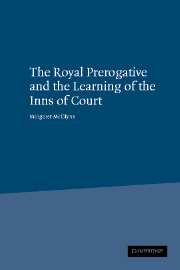Book contents
- Frontmatter
- Contents
- Preface
- List of figures
- List of abbreviations
- Introduction
- 1 The early readings
- 2 Expansion and debate
- 3 Frowyk and Constable on primer seisin
- 4 Spelman, Yorke, and the campaign against uses
- 5 The Edwardian readers and beyond
- Conclusion
- Notes on the appendixes
- Appendix 1 Thomas Frowyk's reading on Prerogativa Regis
- Appendix 2 John Spelman's reading on Prerogativa Regis
- Bibliography
- Index
1 - The early readings
Published online by Cambridge University Press: 04 July 2009
- Frontmatter
- Contents
- Preface
- List of figures
- List of abbreviations
- Introduction
- 1 The early readings
- 2 Expansion and debate
- 3 Frowyk and Constable on primer seisin
- 4 Spelman, Yorke, and the campaign against uses
- 5 The Edwardian readers and beyond
- Conclusion
- Notes on the appendixes
- Appendix 1 Thomas Frowyk's reading on Prerogativa Regis
- Appendix 2 John Spelman's reading on Prerogativa Regis
- Bibliography
- Index
Summary
The military importance of feudal tenures became subsidiary to their financial importance little more than a century after the Conquest. Richardson and Sayles argue that, by the time of Glanvill, “those who render and those who accept homage have no thought of arms, of service in the field: they think of reliefs, marriage and wardship, the profits, not the remotely ancient obligations, of military tenure.” Developments through the thirteenth century continued this trend. A royal ordinance of 1256 attempted to protect the incidents of feudal tenure by restricting the right of tenants-in-chief of the king to alienate lands held of him. Alienation at will meant that the king's control over his lands was weakened by sub-infeudation, as the feudal ladder was stretched. Moreover, his dues were often reduced by the division of land into parcels too small to return the appropriate services. After 1256, alienation was only permitted by licence of the king. There is little evidence of the effect of this change under Henry III, but the records from the late thirteenth century suggest that licences were not easily available until the mid-1290s. At this point, Edward I reversed his previous policy of opposing alienation of lands held in chief. Instead, he granted licences to alienate, under which the alienee would hold the land in chief of the king and for which a fine was paid. Thus the king's financial incidents were safeguarded and he made money from the licence.
- Type
- Chapter
- Information
- Publisher: Cambridge University PressPrint publication year: 2003



